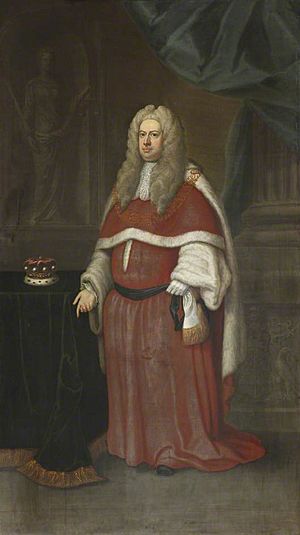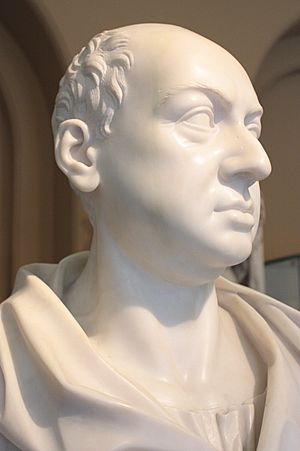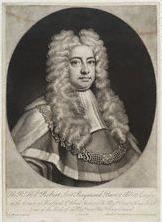Robert Raymond, 1st Baron Raymond facts for kids
Robert Raymond (born December 20, 1673 – died March 18, 1733) was an important English judge and politician. He was also a peer, which meant he held a special title and could sit in the House of Lords. He served in the British House of Commons (like today's Parliament) from 1710 to 1724. Later, he became a very high-ranking judge.
Contents
Robert Raymond's Life and Career
Early Life and Education
Robert Raymond was the son of another judge, Sir Thomas Raymond. He went to famous schools like Eton and Christ's College, Cambridge. He started studying law very young. He became a barrister, which is a type of lawyer, in 1697. In 1710, he was knighted, which meant he could be called "Sir Robert."
Becoming a Member of Parliament
Robert Raymond became a Member of Parliament (MP) in 1710. An MP is a person elected to speak for their local area in the House of Commons. He represented different areas, including Bishop's Castle and Yarmouth. He stayed in Parliament until 1724.
A Top Judge
In 1725, Robert Raymond was appointed as the Lord Chief Justice of the King's Bench. This was a very important job as the head judge of a major court. He held this position until he died. He was also made a Privy Counsellor, which is a group of important advisors to the King.
Protecting English Law
As a judge, Raymond believed that Christianity was a key part of English law. He said that anything that tried to harm Christianity also harmed the government. This meant that trying to change the main religion was against the law.
Joining the House of Lords
In 1731, Robert Raymond was given the title of Lord Raymond. This meant he became a peer and could join the House of Lords. The House of Lords is another part of the British Parliament.
Keeping Old Traditions
Lord Raymond tried to stop the House of Commons from changing the language used in courts. For a long time, courts used "Law French," a mix of French and Latin. He wanted to keep this tradition. He worried that changing it might lead to other old customs being removed. However, his efforts failed, and in 1733, English became the official language for courts.
His Final Resting Place
Lord Raymond's tomb is in Abbots Langley. It was created by a famous sculptor named Peter Scheemakers.
Robert Raymond's Family Life
Robert Raymond married Anne, who was the daughter of Sir Edward Northey. Sir Edward was also a very important lawyer. Robert and Anne had one son. In 1720, Robert Raymond built a large country house called Langleybury in Hertfordshire. You can still see his special symbol, a griffin, on the outside of the building.
 | Frances Mary Albrier |
 | Whitney Young |
 | Muhammad Ali |




